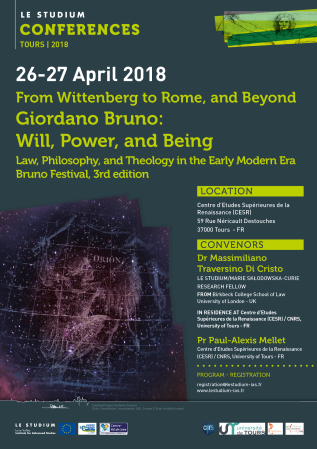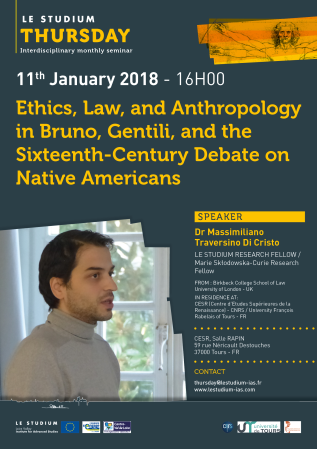Dr Massimiliano Traversino Di Cristo

From
Birkbeck College School of Law University of London - UK
In residence at
Centre for Advanced Studies in the Renaissance (CESR) / CNRS, University of Tours - FR
Host scientist
Dr Paul-Alexis Mellet
PROJECT
Will, Power and Being: uncovering the ancient and mediaeval blueprints of the sixteenth-century question of power
Throughout the twentieth century an impressive amount of scholarship has been devoted to the origin of the concepts of the prince and sovereignty. By focusing here on the ancient and mediaeval sources of sixteenth-century authors we neither wish to present an exhaustive narrative of their contribution to these ideas nor to exalt their career in the Western history of power. Rather, we try to determine the degree to which the modern fate of the notion of power depended on the bearing of early-modern writers on ancient and mediaeval scholarship. What is being explored in my project are the employments and embodiments of ancient and mediaeval authors' ideas and their bearing on the modern investigation of power. Attention is being paid both to classical antiquity (Roman law and philosophical traditions such as Aristotelianism, Platonism and Stoicism) and to Scholasticism (School of Chartres, Franciscan dogmatic, Thomism, etc.).
Within this frame, a special focus will be given to the mediaeval distinction between God's absolute and ordered power (potentia Dei absoluta and ordinata). Through such a distinction and by covering a period of time that spans from eleventh to sixteenth-century authors, I am pinpoint the limits of this evolution, but also its thematic direction. In the first case, with authors like Peter Damian or Alselm of Aosta, we run into the original mediaeval theologians' normative investigation of God's almightiness aimed to extend the horizon of God's creative action. In the second case, authors like Jean Bodin, Alberico Gentili, and Giordano Bruno confront us with the final affirmation of the question as a still normative but no longer theological approach to the realms of law and politics. In this light, the contribution of ancient and mediaeval scholarship to later account of power can be taken as the Archimedean point not just for a re-evaluation of the modern history of the European legal tradition but also, through the distinction between God’s absolute and ordered power, for an account, otherwise incomplete, of its inner and structuring dimension of twofoldness.
Seminar organised by this fellow
- with the cooperation of Dr Paul-Alexis Mellet : Machiavélisme et anti-machiavélisme dans la pensée juridique et politique du XVIe siècle
Publications
In more general terms, many mediaeval authors-and not only theologians used the distinction between God's ordered and absolute power (potentia Dei absoluta and ordinata) to emphasize how, on the one hand, in an 'orderly' way, the realm of nature reflects God's freedom of choice, leading to the existence of a radically contingent order of creation; but also how, on the other hand, in terms of divine absoluteness and in the economy of salvation, God is never bound in his action, which is truly inscrutable and lies above morality. 1 The extensive scholarship on this distinction clearly demonstrates how such a question represented a real 'problem' for mediaeval thinkers rather than just a simple theory. 2 I am limited to mentioning here that the doctrine of God's power comes to the fore with a much different significance in various historical epochs.
Il principio della giustificazione per sola fede costituisce il cuoredella teologia di Lutero. Siffatto principio rappresenta a tutt’oggi il principale elemento di distinzione dottrinaria tra mondo cattolico emondo evangelico e sul superamento di tale distinzione si giocano lesorti delle iniziative ecumeniche promosse negli ultimi decenni. Restando a Lutero, l’accento da lui posto sulla fede ha avuto per con-seguenza di creare nell’immaginario collettivo l’impressione che eglifaccia a meno delle opere. Questo luogo comune trascura in realtà il ruolo etico che il riformatore assegna alle opere. Se è nella centralitàattribuita alla fede che va riconosciuto il maggiore elemento di novitàofferto da Lutero alla storia della civiltà occidentale a lui successiva, per una corretta comprensione del messaggio del riformatore le opererappresentano un elemento irrinunciabile. Il presente testo si proponedi chiarire tale affermazione alla luce di alcuni testi di Lutero, pren-dendo in esame un punto fondamentale dell’etica luterana: la confor-mità delle buone azioni dell’uomo alla volontà di Dio.
Il presente saggio si propone di esaminare le vicende processuali di Maestro Eckhart alla luce dell’agenda, insieme spirituale e politica, del pontificato di Giovanni XXII. Speciale attenzione è rivolta al ruolo rivestito nel caso di Eckhart da Enrico II di Virneburg, arcivescovo di Colonia e potente alleato sia di Giovanni XXII che di Federico d’Austria – il rivale, sostenuto dal papa, di Ludovico IV di Baviera al trono imperiale.
Among the most debated questions of today's historiography, comparison is increasingly relevant. This is mainly due to the impact it has on fields of study as different as anthropology, law, religion, history, etc., and the extremely variegated articulation to which it gives rise between them. In my paper, I will concentrate on the ambit of normative history and consider the case of Alberico Gentili (†1608). With respect to Gentili, comparison helps us trace the role of theology and religious ideas in early-modern legal debates on prince and sovereignty. Special attention will be given to the distinction between God’s absolute and ordered power (potentia Dei absoluta and ordinata) and to Gentili’s image of Luther.
Final reports
Throughout the 20th century, an impressive amount of scholarship was devoted to the origin of the concepts of the prince and sovereignty. By focusing on the ancient and mediaeval sources of 16th-century authors, I tried to determine the degree to which the modern fate of the notion of power depended on ancient and mediaeval debates. I paid special attention to the ethical, anthropological, and legal questions implied in the European encounter with the ‘New World’. Despite its broad relevance to studies on early modern era, this subject has often been disregarded with respect to the history of the concept of power. My analysis helped me trace this subject within the most central debates of the last decades of the 16th century. Through the authors of this time, I showed the interrelation between the discussion on Native Americans and a variety of sources of modern history of ideas, which span early-modern philosophy, cosmology, theology, and public and international law.


